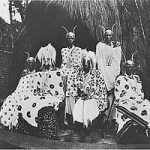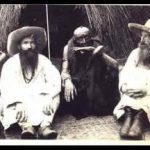Ubuhake And Uruharo
Ubuhake is the institution through which an individual – be he head of a family or of a lineage – commends himself to a patron.
The patron grants protection (most often from himself, as well as from other rapacious notables), and the client renders homage, paying services and goods according to his own station in life.
Commendation seems to be reached, not through a thoughtful process whereby one man asks the protection of another, but rather as the result of a struggle for power among the various individuals. This struggle is usually very mild at the bottom of the social hierarchy and becomes more violent as the top of the pyramid is approached. As was stated in the introduction to this chapter, there is a perpetual probe of relative socio-political power; an individual gathers his “forces” within his relationships lineage, neighborhood, patrons — and reaches out in all directions to find out where he stands in that world of competition. This technique mechanically, so to speak, “shows him his place”. If he comes out of the contest second best, a man has no choice but to retire and try again later — or, if the difference in strength is great, he has no choke but to commend himself (guhakwa), to a superior. This is done in several institutionalized ways.
Fixed by tradition, these ways in which a man commends himself to another are difficult to classify. They are not all recognized as guhakwain the society, and the change from one to another is gradual not only in form, but in intensity. If, however, a summary classification is attempted, it may be said that an inferior-superior relationship can be established by means of commendation between: (1) a Hutu peasant and another Hutu peasant; (2) a Hutu peasant and a Tutsi in a secondary relationship; (3) a Hutu and a Tutsi in a primary relationship; and (4) a Tutsi and another Tutsi. Each of these relationships requires a request by the weaker, and the giving of a token by the stronger party. In the first instance, the token is a hoe or sometimes a banana plantation; in the second, if is a banana plantation; and in the third and fourth relationships, it is a cow.
Uruharo — If the weaker party is a poor peasant and the stronger a richer peasant, the former asks for a hoe. The resulting relationship is expressed in terms of “friendship”. A man, in this instance, is said “to have found a new friend”. The “friend” givesthe first man a hoe (isuka), and that man is required to work in the fields of his “friend” for two days out of a week until the hoe has become a stump (ifuni). The “friend” does not reciprocate. The work due and the institution itself are called uruharo.
In the cases in which the “friend” is a neighbor, he remains a neighbor with all the obligations of a neighbor towards the man to whom he has given a hoe. He might answer the call for assistance in working fields, but this is apart from the uruharo institution, and therefore it imposes simply more obligations on the man who received the hoe.
Cases of infeudation by means of banana plantations involve either an inferior-superior relationship between two Hutu, or, more frequently, one between a Hutu and a Tutsi. Any peasant could — if only agricultural and ecological circumstances were concerned — plant a banana plantation in Remera. But, in fact, all sorts of social and political pressures are brought to bear on him and, finally, he either has to leave, or become the client of a Tutsi. This usually means that the patron has irembo rights over the banana plantation.
It becomes, therefore, more expedient for the peasant to ask for a banana plantation from a Tutsi or a rich Hutu, who, in return, receives a certain number of days work in the fields a week. As in the preceding case, this does not imply a contract; it is simply an acceptance of subservience on the part of the peasant. This is considered as a secondary infeudation which does not necessarily interfere with others. The days of work in the fields (pl. imibyizi), may be done by the man’s wife, children, or, if he is the head of a lineage, by anybody in the lineage who is able to work.
Ubuhake. Ubuhakeis the primary form of infeudation. The client (umugaragu), becomes “the man” (umugabo), of the patron (shebuja). (itis interesting to note that in Kinyarwanda, shebujameans roughly something like “father of the servant”.
All clients of a patron are required to “take the time” (gufataigihe), and to “repair the enclosure” (kubakainkike). Both of these obligations are required, but the emphasis is put on the second one for the Tutsi and relatively powerful Hutu — heads of strong lineages — and, the first is emphasized for the more typical Hutu clients.
To gufataigiherefers to the giving of time by the client for work in connection with the operation of his patron’s household. For a Hutu it means menial tasks, such as cooking, fetching wood, drawing water, cleaning the house, running errands considered very important — and guarding the rugo at night — also very important. For a Tutsi it means various charges, such as supervising the handling of milk, food, cows, or redistributing the gifts of beer that come in from those who pay court.
To kubakainkikeis the most significant obligation of the two. This obligation has been interpreted by students of Ruanda society and by the Belgian administration as a simple chore connected with the repair of rugo enclosures, which are constantly broken up by the cows, etc.The facts, however, are as follows: The patron is entitled to demand of his clients that each of them come to repair a designated part of the enclosure around his rugo. Obviously, repairing the enclosure per sodoes not ensure loyalty, but the fact is that the client is obligated to come at least once a year to repair the enclosure section assigned to him. If indeed the enclosure needs repair — which in itself indicates that the client does not come often — the client’s servants can do the work for him, but his presence on the spot is essential. In the same way, the medieval vassal in Europe had to bring his don annuel; if he did not appear, it was a sign of disloyalty, i.e., that the client felt strong enough not only to refuse the protection of his patron, but even to compete with his ex-patron. Kubakainkikeis undoubtedly the equivalent of homage as practised in medieval Europe. Even after corvée labor and dues in produce were abolished, the patrons of Remera demanded this act of homage from their clients. There are court cases, one of which occurred as late as 1956, in which the patron’s charge against his client is only that: “He did not repair my enclosure,” which is the equivalent of saying “He has not been faithful to me.”
The oath of allegiance. — The oath of allegiance exists as a part of the institution of ubuhake,although the Banyaremera do pot put so much importance in it as in kubakainkike. Swearing fealty is done in assembly at the patron’s rugo. The clients assemble in the evening. They sing and declaim their ibyivugo(a sort of bragging poem in which the speaker tells of some fantastic feats of daring on his part). They, then, try to outdo each other in telling how much each is devoted to the patron. Each such utterance is ended with an informal oath of fealty, which in essence must say something like: “I love my patron, and I shall forever be faithful to him.” This is done also after dances at which each client dances for the patron. The dance is ended by the dancer stopping in front of the patron. Setting one knee on the ground he places his hands, palms together, in the open bands of the patron, apparently as a sign of fealty.
https://uk.amateka.net/ubuhake-and-uruharo/https://uk.amateka.net/wp-content/uploads/2021/05/inyambo.jpghttps://uk.amateka.net/wp-content/uploads/2021/05/inyambo-150x150.jpgModel CitizenshipUbuhake is the institution through which an individual - be he head of a family or of a lineage - commends himself to a patron. The patron grants protection (most often from himself, as well as from other rapacious notables), and the client renders homage, paying services and goods according...BarataBarata rpierre@ikaze.netAdministratorAMATEKA | HISTORY OF RWANDA




